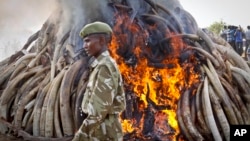A new report from conservation group Save the Elephants shows Hong Kong has more ivory products for sale than any other city in the world. The group says the illegal export of these products to mainland China is undermining that government’s efforts to stop the ivory trade.
According to the report released Thursday in Nairobi, researchers counted more than 30,000 ivory items on sale in Hong Kong in 72 different retail outlets. Most of the items are carved jewelry and figurines, sold to tourists at luxury hotels and shops.
In Hong Kong, the sale of ivory from registered stocks is permitted by law, but export to mainland China is not.
Illegal smuggling
Researchers found 90 percent of the ivory being sold in Hong Kong is being bought by customers from the mainland. Much of it is then smuggled illegally into China.
Save the Elephants founder Iain Douglas-Hamilton said the practice is damaging to China’s efforts to stop demand for elephant ivory.
“I think the future of Africa’s elephants actually lie in the hands of China. Hong Kong is part of China, and it is undermining bans that are increasingly being deployed in China,” he said.
Douglas-Hamilton said 100,000 elephants were killed across Africa for their ivory between 2010 and 2012. Most of the slaughter is driven by demand in Asia.
Hong Kong has not legally imported ivory since 1990; new items are carved and sold from existing stocks.
Although the report does not conclude that Hong Kong has been marketing illegal ivory, conservationists have suggested traders in the city may be slipping poached ivory into their stocks.
Seized shipments
Report lead researcher Esmond Martin said Hong Kong is a known transit point for illegal ivory, and notes authorities there have seized several large shipments from Africa.
“With these large consignments being intercepted in Hong Kong, almost all of them, according to the government and to the research that we have carried out, is going to mainland China, almost all of it," said Martin. "And this is an extremely important point. But the question to ask is how much is going through Hong Kong that is not being picked up? And that is we do not really know much about.”
Martin said some of the larger shipments recently seized in Hong Kong originated from Kenya, Tanzania and Togo.
He said corruption along the supply line, starting in the national parks where elephants live, remains one of the most pressing challenges to stopping the ivory trade.




